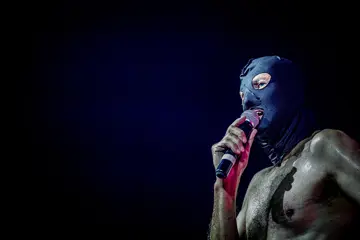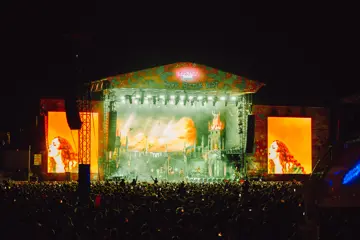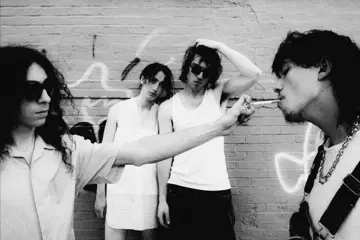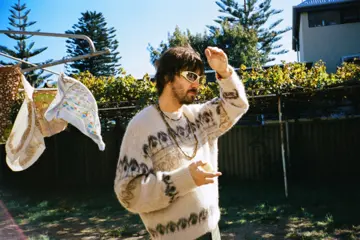One of the first responses to the news that Barclays Bank had suspended its five-year sponsorship with UK festivals Download, Isle of Wight and Latitude came from Tom Morello.
“A bank funding war crimes has no place at music festivals,” the Rage Against The Machine guitarist posted, calling the move “a testament to the power of artists taking collective action for human rights.
“I’ve been pushing hard for this behind the scenes for some time, and I salute all the artists who have taken a stand to help make this historic withdrawal happen.”
The Bands Boycott Barclays group called it “musicians & industry professionals using our cultural power to stand in solidarity with Palestine” while Enter Shikari reposted with as one-word explanation: “solidarity”.
CMAT, Mui Zyu, SPEED, Pillow Queens and Georgia Ruth were among those who pulled out of the festivals because of the Barclays connection.
Barclays said it does not directly invest in firms but does provide financial services to “public companies that supply defence products to NATO and its allies”.
The bank has been targeted by campaign group Palestine Action, which was accused of targeting 15 Barclays sites last week by breaking windows and splashing red paint on walls, calling on it to divest from arms companies that sell to Israel, as well as firms linked to fossil fuels.
Don't miss a beat with our FREE daily newsletter
Barclays added: “The protesters’ agenda is to have Barclays debank defence companies, which is a sector we remain committed to as an essential part of keeping this country and our allies safe.
“They have resorted to intimidating our staff, repeated vandalism of our branches and online harassment. The only thing that this small group of activists will achieve is to weaken essential support for cultural events enjoyed by millions.
“It is time that leaders across politics, business, academia and the arts stand united against this.”
SXSW
Three months ago, dozens of acts and tech, film, and movie panel speakers pulled out of South By Southwest (SXSW) in Austin in protest of the event's sponsorship by the US military (one of its six biggest sponsors) and defence companies in the Gaza war.
The Army refused to pull back, saying, “SXSW presents a unique opportunity for the Army to meet technology innovators and leaders, explore new ideas and insights, and create dynamic industry partnerships as we modernize for the future.”
Texas Governor Greg Abbott told boycotters: “Bye. Don’t come back. We are proud of the U.S. military in Texas. If you don’t like it, don’t come here.”
SXSW “did not agree” with the Governor’s attitude and emphasised, in one post, “We fully respect the decision these artists made to exercise their right to free speech.”
In another, it defended its decision to accept the benefactors. “The defence industry has historically been a proving ground for many of the systems we rely on today.
“These institutions are often leaders in emerging technologies, and we believe it’s better to understand how their approach will impact our lives. The Army’s sponsorship is part of our commitment to bring forward ideas that shape our world.”
Australian Actions
Australian festivals rely on sponsorship to stay alive. According to Creative Australia’s recent Soundcheck report, 63 per cent draw on financial sponsorship, 40 per cent on state/territory grants, 29 per cent on in-kind sponsorship and 21 per cent on federal grants.
The money helps market the event to a wider and more diverse audience, book larger acts and make the site more comfortable.
Sponsors, in turn, need festivals for marketing opportunities, increased brand visibility, and stronger consumer engagement. The greater fragmentation in festival audiences is a great fuel for such partnerships because they reach targeted demographics.
For instance, Coachella’s diverse crowd is 48 per cent African Americans, 42 per cent Hispanics and 42 per cent identifying as LGBTQ+.
In Australia, it’s the artists and activists who have shown that festivals belong to the people, and they can dictate its soul and conscience. There were high-profile wins over mining companies, who specifically wanted the partnership to prove they were part of the solution and not part of the problem.
In 2020, the Fringe World festival in Perth caused a stir by accepting naming rights sponsorship from oil and gas giant Woodside Energy. 250 artists and climate activists grouped themselves under the banner of Fossil Free Arts WA.
Fringe World made things worse by demanding artists “not do any act or omit to do any act that would prejudice any of Fringe World’s sponsorship arrangements”. In other words, keep your mouth shut.
There were protests at the launch of the 2021 Fringe World, disruptions, petitions, protest marches, bushfire vigils, and a month-long show in which artists read from a climate change scientific paper. Eventually, Woodside withdrew officially in 2024.
Two years later, performers at the Darwin Festival claimed they were also hit with “gag” clauses about making any comment about Santos’ sponsorship after a petition with 3,500 signatures circulated calling for the oil and gas producer to withdraw.
Fossil Free Arts WA had also urged other festivals and arts organisations to “draw inspiration” and “call out the promotion of fossil fuel extremists.” In 2023, Perth Festival cut ties with US fossil fuel giant Chevron after a four-year protest campaign. The partnership lasted 18 years, including ten years as a “major partner”.
Protests also undid the partnership in 2014 between Sydney Biennale and Transfield, whose services at the time were managing the offshore detention centres in Nauru and Manus Island.
Then-Minister of Communications Malcolm Turnbull called the artists “viciously ungrateful.” Minister for the Arts George Brandis demanded that the Australia Council introduce a policy allowing arts groups to receive funding to not turn down private sector funding for political reasons.
In 2022, a 30-act boycott began at the Sydney Festival for dance performance Decadance at the Sydney Opera House of work by Israeli choreographer Ohad Naharin, after the Israeli Embassy in Canberra’s logo appeared in the program for giving $20,000 for the show.
The Sydney Festival kept the $20,000 but said it would not accept money from foreign governments in the future.
These days, festivals seem to have learned that accepting money from sectors that are unpopular with their audiences might be pragmatically appealing but could damage the festival’s brand in the long run. Every dollar, after all, has a price.
















